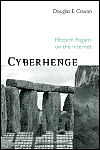
All those neopagan websites of plagiarized material, all those underage neopagans assuming false power personas and the capitalization of this niche by con artists publishers and the generically shameless have finally risen from their graves of inattention to haunt even the most innocent seeker surfer. But like any haunting, some invitation must be set forth. The book must be opened. The book must be read.
And a book like Cyberhenge will likely not be read by it’s subjects.
Just as was lamented about Dizerega’s Pagans and Christians, the audience that most needs to read this book is more likely miss it completely. Neopagans need to read this book, perhaps as part of a program entitled “so you’re thinking of starting a Pagan website, cybercoven, or other Internet pagan community venture.” In subtext, Shovelware: Please Don’t. Neopagans are viewed sans glamour in this sociological venture. The unattractive angle stems from Internet behaviors every web surfer has seen -- from ridiculous claims to flaming to naked snobbishness.
To write Cyberhenge, Cowan combed the depths and heights (mostly the depths) of the neopagan Internet. He strolled (not trolled) Yahoo! He analyzed Google results and made clear why those numerics are invalid in a study such as this. He made note of the embarrassing neopagan online phenomena of “shovelware” –texts that are printed ad nauseum on Wiccan and other neopagan web pages. Perhaps in an attempt at generosity, Cowan attributed this repetitive phenomenon as part of the “open source” movement, rather than a grand old tradition of plagiarism as evidenced by Francis Barrett.
Except when specific individuals made claims so ridiculous no author nor three year old could accept them, Cowan does not pass judgment. He actually enters the study prepared to find more of the positive than he does. This is no sociological study set out to make Pagans look bad: neopagans make neopagans look bad. Cowan simply reports on his findings, noting inconsistencies in statement of belief among neopagans just as inconsistency manifests in any other religious movement.
Cyberhenge might become a benchmark for future studies on modern Paganism, although its doubtful many Pagans themselves will see fit to add this book to their shelves. In fact, with the exception of those mentioned in the book itself, there is no evidence that this book has received any attention within the neopagan community. A search for other reviews has turned up nothing, and a search for the author turned up a submission of papers to the Pagan Studies program in Florida, but nothing further.
At best, Cowan caught a snapshot of migrating tribes in the wake of ever-advancing technologies. He went looking for something on the Internet that was already a thing of the past in many ways, and in the way the Internet passes time, he spent much of his tour digging through ancient ruins and pausing over tourist traps.
~review by Diana Rajchel
by Douglas E. Cowan
Routledge Press
pp. 224 (no cover price listed)
